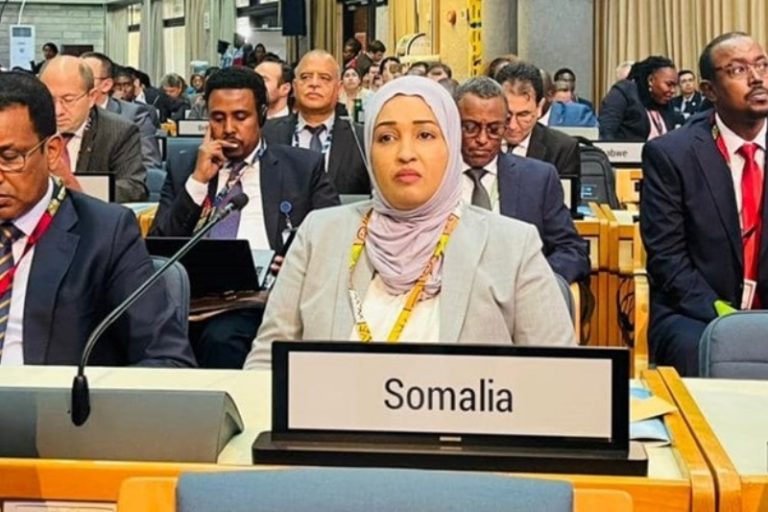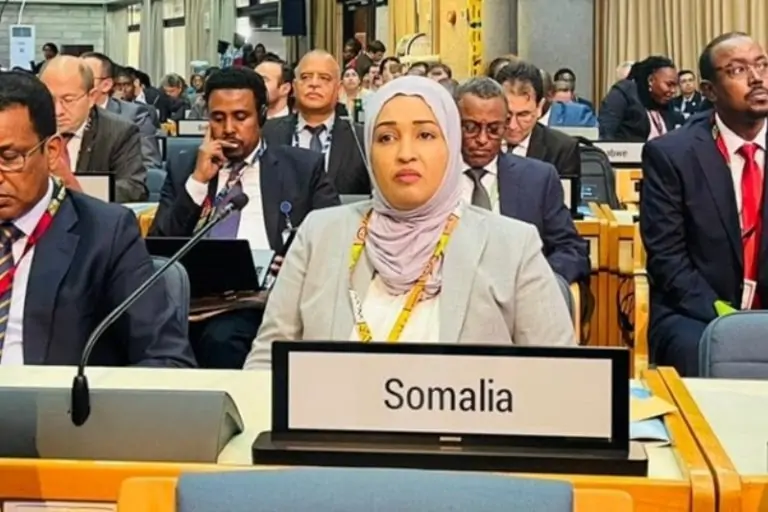

somali president attends unea 6 commitment to global environmental resilience
President Hassan Sheikh Mohamud’s participation in UNEA-6 underscores Somalia’s commitment to global environmental initiatives. The conference, hosting nearly 5,000 delegates, serves as a pivotal platform for Heads of State and Government from 193 UN Member States to address pressing environmental issues.
As the world’s highest-level decision-making body for environmental matters, the United Nations Environment Assembly (UNEP) plays a central role in shaping global policies. Minister Khadija Mohamed Al-Makhzoumi and Ambassador Jabril Ibrahim Abdulle’s participation highlights Somalia’s proactive engagement in the conference.
The core objective of UNEA-6 revolves around fostering harmony between humanity and nature. Emphasis is placed on improving the well-being of vulnerable populations worldwide, aligning with Somalia’s commitment to addressing environmental challenges at both national and international levels.
In a press briefing, Inger Andersen, UNEP’s Under-Secretary-General, outlines the significance of UNEA-6, where 20 resolutions will be discussed. These resolutions aim to inject fresh momentum into the global pursuit of a resilient, green, and inclusive future for humanity, marking a crucial step in addressing environmental challenges.
Simultaneously, UNEA-6 coincides with Somalia’s recent enactment of the Environmental Protection and Management Law. President Hassan Sheikh Mohamud signed the law into effect, demonstrating the nation’s commitment to sustainable environmental protection. The law allocates administrative responsibilities and coordinates ecological management activities.
Somalia’s proactive approach to environmental challenges is evident in the National Regreening Initiative. Launched last year, this initiative aims to plant 10 million trees, combating deforestation and enhancing biodiversity. These efforts reflect Somalia’s dedication to climate resilience amid devastating droughts and environmental crises.
Somalia, severely impacted by climate change, confronts challenges such as environmental crimes, inadequate protective laws, deforestation, and toxic dumping. The Environmental Protection and Management Law is seen as a crucial step towards overcoming these challenges, providing a legal framework to safeguard the environment.
The recent El Niño rains have had dire consequences in Somalia, affecting millions of people. Displacement, deaths, and the surge in cholera cases highlight the humanitarian impact of climate shocks. Somalia’s participation in UNEA-6 becomes imperative in seeking global collaboration to address these urgent challenges.
President Hassan Sheikh Mohamud’s engagement in UNEA-6 signifies Somalia’s active role in global environmental diplomacy. As he joins fellow Heads of State and Government, there’s an opportunity to articulate a vision for sustainable development, not only for Somalia but for vulnerable regions worldwide. This diplomatic endeavor aims to foster collaboration and garner support for environmental initiatives, underscoring the interconnectedness of global ecological well-being.
Somalia’s President brings a unique perspective to the global stage, emphasizing the need for collective responsibility. In a world facing escalating environmental challenges, diplomatic efforts become instrumental in crafting shared solutions. President Mohamud’s presence at UNEA-6 positions Somalia as a proactive participant in shaping global environmental policies, contributing to a collective commitment for a greener future.**
The recent enactment of the Environmental Protection and Management Law stands as a catalyst for environmental change in Somalia. This legislative milestone signifies the nation’s determination to address long-standing challenges, including environmental crimes and deforestation. By providing a comprehensive legal framework, Somalia aims to create a conducive environment for sustainable practices, ensuring the effective coordination of ecological management initiatives.
The Environmental Protection and Management Law represents a transformative step towards a more resilient Somalia. It not only allocates administrative responsibilities but also signifies a commitment to combating environmental degradation. This legislation reinforces Somalia’s pledge to environmental stewardship, offering a blueprint for other nations grappling with similar challenges. As President Mohamud attends UNEA-6, the spotlight on Somalia’s legislative efforts becomes a beacon for environmentally conscious governance.**
Somalia’s National Regreening Initiative emerges as a practical approach to bridge the environmental gap. Planting 10 million trees not only contributes to biodiversity and climate resilience but also addresses the pressing issue of deforestation. This grassroots initiative reflects the country’s commitment to tangible actions, showcasing that environmental sustainability requires collective efforts from governments, communities, and individuals.
Beyond rhetoric, Somalia’s National Regreening Initiative demonstrates the transformative power of community-driven environmental initiatives. By engaging citizens in tree planting and conservation efforts, the initiative instills a sense of shared responsibility for the environment. As President Mohamud participates in UNEA-6, the National Regreening Initiative becomes a model for bottom-up environmental action, reinforcing the idea that impactful change often starts at the local level.
The U.S.-based driver training company Zutobi analyzed road safety worldwide and found South Africa stays last in driving danger since…
The Basketball Africa League (BAL) returns for its 2025 season with exciting changes and developments. Since 2019 the NBA-linked basketball…
The Somali president supports their military forces to eliminate the threats from Al-Shabaab, ISIS, and Al-Qaeda. The Somali National Army…
UAE President Sheikh Mohamed bin Zayed Al Nahyan held talks with President Faustin Archange Touadéra of the Central African Republic…
African football teams struggle intensely in the World Cup Qualification rounds to earn their place on the international football stage.…
The journey toward the 2026 FIFA World Cup is rapidly intensifying for all African teams, who now hold a historical…
This website uses cookies.